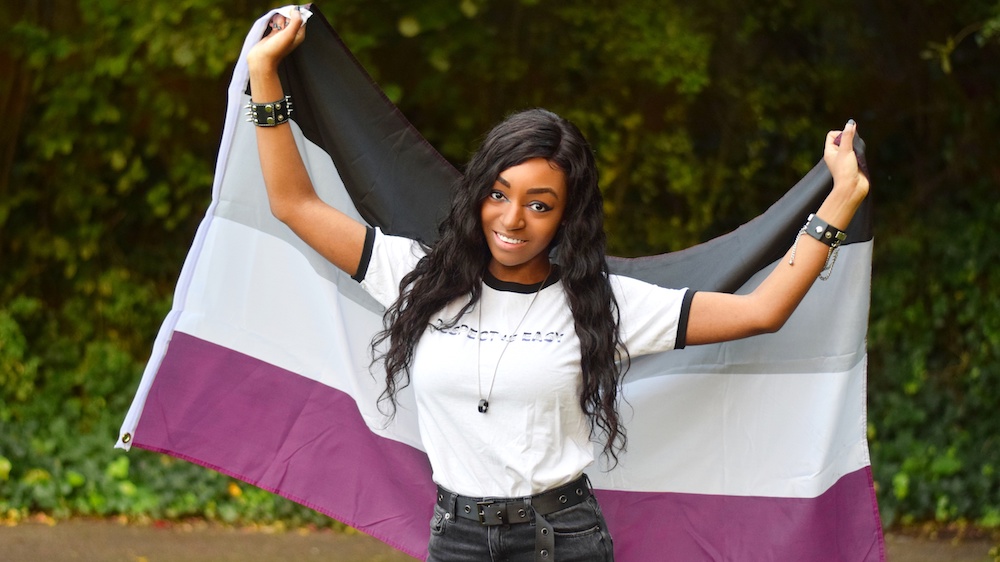If you’re interested in sharing your opinion on any cultural, political or personal topic, create an account here and check out our how-to post to learn more.
Opinions are the writer’s own and not those of Blavity's.
____
Asexuality is often defined as experiencing little-to-no sexual attraction toward any gender. I tend to think of it as the sexual orientation that isn’t oriented anywhere. Like the rest of human sexuality, asexuality encompasses an umbrella of experiences, but no matter how you experience asexuality, it isn’t associated with Black people.
To be Black in Western society means existing as the most hyper-sexualized racial group there. As a dark-skinned Black woman, it means being depicted as a sassy, twerking girl with attitude and an aggressive, undesirable societal problem at the same time. That intersection means that it took a decade for people to believe I was asexual, even though I never pretended to be anything else.
The white people around me said that I "didn’t look asexual," whether I was 15 years old in my school uniform or 20 at a dinner party, as it wasn’t really about my clothes. For years, my West Indian family assumed that I was just chaste and well-behaved. When I made it clear that I wasn’t a celibate straight woman, but an asexual one, my inherent queerness ignited arguments about the LGBT corruption of children and in one instance, being asked if I'm a pedophile.
Black men outside of my family have either taken my asexuality as a reason to rejoice or as a rejection. I’ve had guys perform a celebratory "virgin dance" in the middle of a nightclub after learning that I was asexual. They were delighted to have found a "pure woman," but I’d rather experience that than the guy who kept screaming, “But do you masturbate?!” at me as I ran from him down a dark train platform.
In 2017, I started to use the platform I had gained through my modeling career to be the Black asexual representation I’d never had. While I’ve found success as a now award-winning activist, it quickly became apparent that the way I was perceived — compared to white asexual activists — was harsher and racialized.
Most of the negativity I receive comes from white people across various intersections. Members of the white queer community embraced me as the token Black asexual before the Black queer community even started including asexuality in the conversation. But I’m also in the firing line for those who think I don’t belong. If anyone is going to be personally accused of “never experiencing oppression” and “taking up space/resources,” it’s the Black asexual girl with a platform, because the blue tick means these remarks aren’t racially tinged targeting but similarly constructive criticism to someone who is fair game.
Whether it’s older white women or young white men, my perceived sexual unavailability is deemed as threatening and provokes anger. The rhetoric is strangely similar, stemming from the belief that Black women exist for the white (usually) male gaze and that I am, therefore, existing incorrectly and can’t exist at all. To be a Black asexual woman is a paradox and a slap in the face.
Turning a blind eye to white asexual women who dress in similar ways, it’s the Black one who is asking to be raped for wearing any less than jeans and a t-shirt, but still “pornographic” when fully clothed. The need to sexualize Black women is so strong that our actual sexuality and self-expression have absolutely nothing to do with it. The emphasis on clothing is similarly a cover. They’re focused on what’s beneath.
Even navigating the asexual community — yet another overwhelmingly white space — has proven complicated. I am held as a symbol of the community’s diversity while others would not-so-secretly prefer not to be represented by a Black woman, and eagerly await the opportunity to band together to bring me back down to size whenever I don’t serve them well enough. To be Black, female and asexual adds even more layers to an already politicized existence. It means challenging, provoking and educating simply by living. But as someone who finds beauty in chaos and power in creating change, I wouldn’t want to be anything else.
